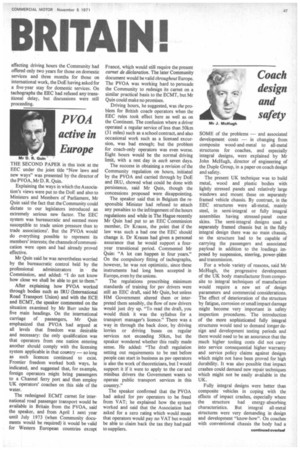PVOA i active n Europe
Page 49

If you've noticed an error in this article please click here to report it so we can fix it.
THE SECOND PAPER in this look at the EEC under the joint title "New laws and new ways" was presented by the director of the PVOA, Mr D. R. Quin.
Explaining the ways in which the Association's views were put to the DoE and also to Ministers and Members of Parliament, Mr Quin said the fact that the Community could dictate to our legislators introduced an extremely serious new factor. The EEC system was bureaucratic and seemed more susceptible to trade union pressure than to trade associations'. But the PVOA would do everything possible to represent its members' interests; the channels of corrununication were open and had already proved effective.
Mr Quin said he was nevertheless worried by the bureaucratic control held by the professional administrators in the Commission, and added: "I do not know how close we shall be able to get to them."
After explaining how PVOA worked through bodies such as IRU (International Road Transport Union) and with the ECE and ECMT, the speaker commented on the situation examined by Mr Burr under his five main headings. On the international carriage of passengers, Mr Quin emphasized that PVOA had argued at all levels that freedom was desirable and necessary: the only qualification was that operators from one nation entering another should comply with the licensing system applicable in that country — so long as such licences continued to exist. Frontier freedom worked both ways, he indicated, and suggested that, for example, foreign operators might bring passengers to a Channel ferry port and then employ UK operators' coaches on this side of the water.
The redesigned ECMT carnet for international road passenger transport would be available in Britain from the PVOA, said the speaker, and from April 1 next year until July 1973 (when Community documents would be required) it would be valid for Western European countries except France, which would still require the present
carnet de declaration. The later Community document would be valid throughout Europe.
The PVOA was working hard to persuade the Community to redesign its carnet on a similar practical basis to the ECMT, but Mr Quin could make no promises.
Driving hours, he suggested, was the problem for British coach, operators when the
EEC rules took effect here as well as on the Continent. The confusion where a driver operated a regular service of less than 50km (31 miles) such as a school contract, and also occasional work such as a licensed excursion, was bad enough; but the problem for coach-only operators was even worse.
Eight hours would be the normal driving limit, with a rest day in each seven days. The success in obtaining a revision of the Community regulation on hours, initiated
by the PVOA and carried through by DoE and IRU, showed what could be done with persistence, said Mr Quin, though the concessions proposed were disappointing.
The speaker said that in Belgium the responsible Minister had refused to attach any penalties to the infringement of the hours
regulations and while in The Hague recently Mr Quin had put to an EEC Commission
member, Dr Krauss, the point that if the law was such a bad one the EEC should change it. Dr Krauss had given a personal assurance that he would support a four year transitional period. Commented Mr Quin: "A lot can happen in four years."
On the compulsory fitting of tachographs, however, he was not optimistic, since these instruments had long been accepted in Europe, even by the unions.
The regulations prescribing minimum standards of training for psv drivers were still an EEC draft, said Mr Quin, but unless HM Government likened them or interpreted them sensibly, the flow of new drivers would just dry up. "To read the draft, you would think it was the syllabus for a transport manager's licence." There was a way in through the back door, by driving lorries or driving buses on regular services not exceeding 50km, but the speaker wondered whether this really made sense. He added: "The draft regulation setting out requirements to be met before people can start in business as psv operators is also the work of theoreticians, but I would support it if it were to apply to the car and minibus drivers the Government wants to operate public transport services in this country."
The speaker confirmed that the PVOA had asked for psv operators to be freed from VAT; he explained how the system worked and said that the Association had asked for a zero rating which would mean that operators would pay no VAT but would be able to claim back the tax they had paid to suppliers.




































































































































































